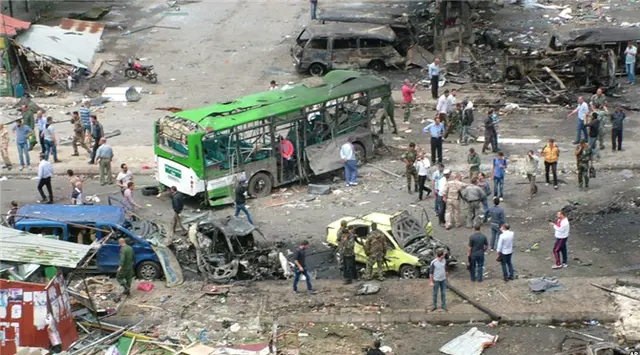Bloody bombings used to be only TV news for the people in Syria's coastal city of Jableh untile violent blasts claimed shockingly high death toll on Monday.
Even though they have soldiers serving in the Syrian Armed Forces and despite the fact that many of their young have died in the course of battles nationwide, but the people of Jableh in the countryside of the coastal city of Latakia were largely saved from the sweeping violence that has engulfed other Syrian cities over the past five years of crisis.
On Monday, the spectacle in Jableh was different.
Several bombings rocked the main bus station in the city, leaving a huge death toll and a great deal of destruction.
The most horrible bombing was carried out later, when a suicide bomber disguising as a paramedic infiltrated the emergency room of the city's National Hospital, blowing himself up, while the wounded from the station's bombings were admitted to the same hospital.
The bombings in Jableh killed over 106 people and wounded tens of others.
Samer Ali, one of the residents of Jableh, told Xinhua that the bombings proved that the perpetrators are terrorists and exposed their inhuman nature.
"This heinous act only consolidates the perspective that the perpetrators are just terrorists. This is an act of terror and cruelty. They carried out this crime in the morning when people were going to their jobs, going to hospitals and schools. They killed those people before reaching their jobs their hospitals and their schools," he said.
"On top of that they followed the people who got injured to the hospital and blew themselves in the emergency room. There is nothing more despicable and villainous than this act... they are not human," he added.
For his part Haidar Taha was holding his son and roaming the blast site, and when asked why was he carrying his kid around, the man said he was teaching his son what terror looks like.
"How can I describe to you the horrific scene of the body parts and the scatter flesh and blood. We have seen dismembered people, and charred bodies. I am really speechless, don't known what to say, May God punish them."
The city's entrance to Jableh was jam-packed with cars, as the checkpoints tightened their security measures, carefully scrutinizing the cars entering the city.
Inside the city most of the shops were shut down for both fear of other possible bombings, and grief over the those who have passed away.
Astonishment was on people's faces, even though they tried to hide it with defiant looks.
Muhammad Qarmoush, a young man from the city, was standing next to his friends' stall, which was totally ravaged by the blast inside the bus station.
Qarmoush was astonished and confused, guarding what is left of the stuff of his friend, who was wounded when a shrapnel from the bombings sliced through the right side of his neck.
"By God's will we will defeat the terrorists and terrorism and we are not afraid of them. We have a strong belief in God that he will help us against those terrorists," he told Xinhua.
In the National Hospital, which sustained the second bombing by the bomber in a paramedic outfit, Doctor Qusai Khalil, the head of the hospital, was checking the damages after the blast sent his hospital out of service.
"The medical team harried to the emergency room to help the wounded. One of the paramedics blew himself up inside the emergency room. It turned out that the bomber was in disguise and infiltrated the hospital to blow himself and kill those who were taken to the hospital," he told Xinhua.
"Within minutes the emergency room was in ruins. The hospital is totally out of service. We have sent all of the ill people and the injured who survived the bombing to other hospitals in Latakia. We have lost many members of the medical team. The sad part is that those who survived the first bombing and came to the hospital to get treatment died by the other blast."
After Jableh's deadly bombing, other bombings also hit a bus station in the coastal city of Tarturs, also the first to hist the city during the conflict, killing 48 people.
The Islamic State (IS) group claimed responsibility for the Jableh and Tartus bombings.
The bombings came apparently as a message to the governemnt on the IS ability to strike in its main strongholds, as Tartus and Latakia are both bastions of the Syrian administration of President Bashar al-Assad.
Latakia also contains the Hmaimim airbase, which has been used by the Russian air force as a base to launch airstrikes against radical rebel groups, while Tartus also contain a Russian naval base.
The Syrian government on Tuesday said there will be a compensation to the victims of the bombings.
(APD)
 简体中文
简体中文

